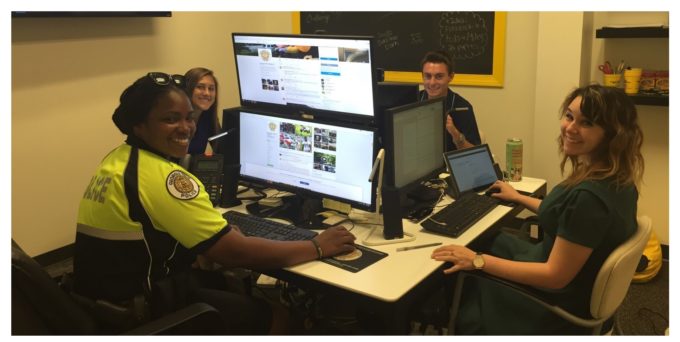Improving officer intuition through social media
 Have you ever talked to a law enforcement officer who recounted a story of his life when he was saved by a sixth sense that something wasn’t right on a call? Neuroscientists have recently started researching intuition, also referred to as the sixth sense, to determine how it works. Based on some findings, intuition expands as the brain learns and stores away new information in the subconscious. The more connected people are to the world around them, the greater the volume of information received and stored for future use. As law enforcement officers continue to connect through social media, they pass on their own insights on their own triumphs and failures. They discuss how they handle various calls, situations that went right and wrong. The information is stored in the recipient’s subconscious brain and may come back as sixth sense, hair rising on the back of neck, intuition that says something is not right and to be prepared. We may find as law enforcement officers continue connecting and sharing their insights around the world that social media may actually help improve intuition and increase officer safety.
Have you ever talked to a law enforcement officer who recounted a story of his life when he was saved by a sixth sense that something wasn’t right on a call? Neuroscientists have recently started researching intuition, also referred to as the sixth sense, to determine how it works. Based on some findings, intuition expands as the brain learns and stores away new information in the subconscious. The more connected people are to the world around them, the greater the volume of information received and stored for future use. As law enforcement officers continue to connect through social media, they pass on their own insights on their own triumphs and failures. They discuss how they handle various calls, situations that went right and wrong. The information is stored in the recipient’s subconscious brain and may come back as sixth sense, hair rising on the back of neck, intuition that says something is not right and to be prepared. We may find as law enforcement officers continue connecting and sharing their insights around the world that social media may actually help improve intuition and increase officer safety.
In the world of public safety in general, and law enforcement in particular, our minds are constantly receiving information. We take information in from the world around us through routine calls, social interactions with citizens, and our relationships with other officers. Just as important as the general information we receive, we learn what was successful and unsuccessful. Over the years, we store vast amounts of information as patterns of data in our long term memories. As we are handling daily calls for service our brains search for similar patterns of information that correlate with what is happening and compare it to past memory patterns. Through atomicity, an ultra high speed process for moving information from long-term to working memory, we intuitively recall stored patterns of data telling us how we have handled similar situations. As Daniel Kahneman describes in Thinking Fast and Slow, “Intuition is nothing more and nothing less than recognition.” As we handle our calls, we are constantly adding to the stored patterns and building blue prints for future use. Even if a similar incident occurred 12 years earlier, and long removed from our working memory, it is waiting there only to manifests itself at intuition.
Now consider how social media enters the conversation. The internet and social media have now changed how we exchange information. Before the social media explosion, officers learned to do their jobs in their academies, field training officers, their shift mates, and simply doing the job. A slow learning curve existed for officers to build their skills and increase the data stored in their long term memories. The learning bandwidth was narrow and officers have been injured from lack of knowing how officers in another part of the world may have developed more effective tactics to handle certain calls. Officers didn’t have the luxury to get on the internet and immediately connect to other officers worldwide to seek advice. Instead of interacting and learning from a small group of people, the learning bandwidth has now exploded through social media allowing people to connect around the world.
Today, officers read posts, watch videos and participate in forums to discuss situations instantaneously across continents and oceans. An officer in the United States may enter a forum or post on a message board and discuss an incident or video, recounting what occurred to an officer in Venezuela with officers in Ireland and Thailand. Through these connections officers learn new techniques and validate proven tactics worldwide. As we watch a vehicle pursuit on YouTube, have a discussion on LinkedIn, or interact on a blog, we are continually building our mental dossiers. During these discussions, information is processed in our brains and stored in the long term memory for later use. Through social media integration we are able to learn from each other as if we were at the incident ourselves. Imagine a critical incident that occurs which your formal training never covered; however, you are very well connected through social media. Several officers you talk to around the world have had experience that relates to this incident and the information comes flooding to your working memory as intuition, as if you did have the prior experience. Through your automatic downloading and storing of information learned through your social media connections to other officers, your mind provides several options. Your mind says option A did not work in New Zealand, however, Option B worked in Canada and Option C worked in Hungary. You then pick the option that best matches your circumstances. After the incident you interpret this as having a streak of intuition about what to do. The “intuition” was merely your brain recognizing the patterns in others had shared through social media.
Many organizations are still learning to trust and handle social media. There is a fear that officers will learn bad habits or tactics that violate their own cultural norms or organizational policies. Organizations need to utilize social media because it is not going to disappear and will continue to expand and evolve over time. Organizations can be a part of shaping the conversation or they will be relegated to reacting to the conversations. First and second line supervisors should encourage officers to be more connected and expand their perspectives and develop new insights from the diversity of officers around the world. As these conversations grow, officers are becoming more conscious of successful tactics that they may employ or new officer survival considerations to improve safety. As younger, more socially connected officers move up in their organizations the social media trust aspect will improve. Officers connected worldwide will continue to learn from each other and add to their long term memories. In the future, an officer’s life in Europe may be saved through and intuitive feeling that was developed through an on line conversation years earlier with officers in Africa and North America.
We are increasing our knowledge on how the brain works and the process that creates and expands intuition. Through social media we are having worldwide conversations that expand our knowledge of tactics and officer safety issues. We now know intuition is not simply a flash of brilliance but rather, your brain searching for long stored and forgotten information that may save your life. By keeping the conversations going we are in fact helping to keep each other safe.
References:
Helic, Sebastein & Cousieau, Denis. Cognitive Neuroscience of Automaticity: Behavior and Brain Signatures.: http://ccn.psych.purdue.edu/papers/Helie-Cousineau-automaticity_review-final.pdf
Intuition and unconscious learning – Less Wrong: http://lesswrong.com/lw/59v/intuition_and_unconscious_learning/
Kahneman, D. (2011) Thinking Fast and Slow. New York: Farrar, Straus and Giroux,
Warren, S. (1997) Remember this: Memory and the brain: http://serendip.brynmawr.edu/biology/b103/f97/projects97/Warren.html
Photograph: examiner.com: http://www.examiner.com/images/blog/wysiwyg/image/Brain-Power6.jpg
Mike Phibbs has 19 years of police experience. He has received the Police Medal for valor and spent a career developing innovative techniques to improve organizational effectiveness and efficiency. Mike has created a splash in the public safety community in the past few years. He has authored cutting edge articles on organizational development covering such topics as Sector Policing, Employee Engagement, Chief Score and Organizational Branding in Public Safety. His articles have been published twice by the FBI Law Enforcement Bulletin, Virginia Center for Police Innovation, and on line magazines, websites and blogs. He helped developed the Pyramid of Performance Factors which show how an organizations structure and individual officers / firefighters emotional commitment combine to impact engagement and performance. He has taught at the Virginia conference of the International Police Chiefs Association, Mid-Atlantic Fire Chiefs Conference, and been among a hand selected cadre of national leaders to teach at the award winning Virginia Fire Officers Academy. Mikes social media writing is intended to use humorous stories to show how different leadership techniques can make an emotional impact on individuals and then be used to transform organizations.



